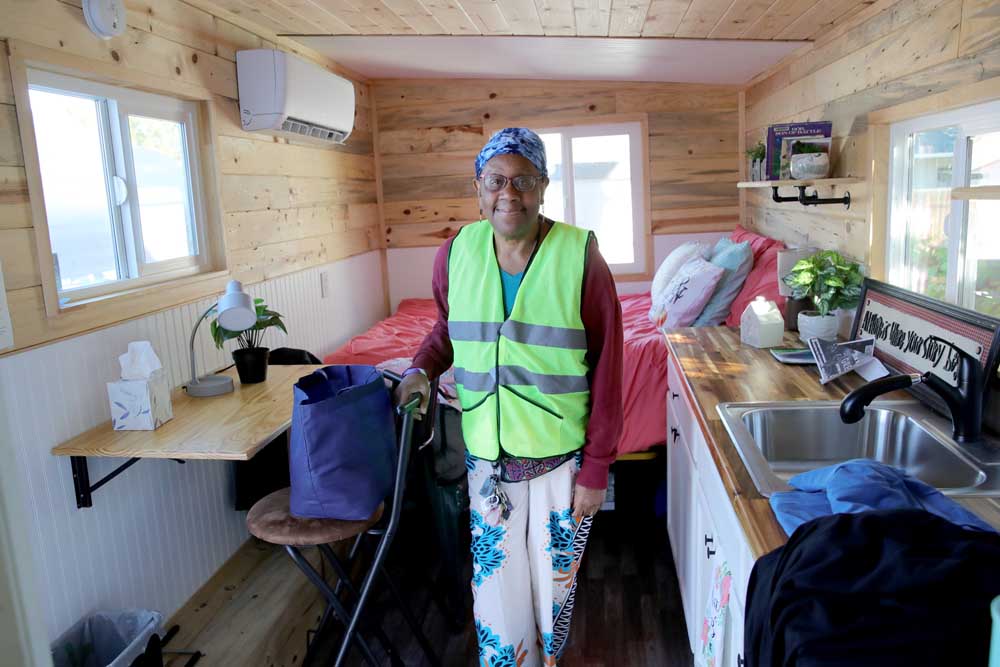Tiny home village along Biddle Road to open this fall for homeless seniors
Published 3:00 pm Wednesday, October 9, 2024

- Fern Gaston-Rush stands inside a tiny home on display at Set Free Christian Fellowship in Medford.
Two years of blood, sweat and tears — and ongoing fundraising efforts — could culminate in a tiny home community for abandoned and homeless seniors before year’s end.
Medford pastor Chad McComas, who runs Set Free Christian Fellowship in Medford and was the founder of Rogue Retreat, announced plans for Set Free’s planned Joy Community earlier this year.
Planned alongside the vacant meat packing plant at 2811 Biddle Road, near Crater Lake Ford and Camping World, the site previously was used as a campsite for Rogue Retreat.
It could welcome its first 10 seniors before Thanksgiving, McComas said.
The senior village will be a combination of tiny homes. Some will have bathroom and kitchenette setups, and others will include more basic units, which will share a community restroom and shower house.
McComas said he set out on the project to address a growing regional increase of homeless senior citizens. By some counts, senior homelessness could triple by 2030, he said.
“Homeless shelters across the nation are filling up with seniors, and you get these seniors in there and they’re not going to find a job and move along,” McComas said.
“If we can provide a place where they can live the rest of their lives, and not worry about somebody throwing them out or them running out of time, we can free up these beds for other homeless who need them.”
Standing under sunny skies on a recent morning near the Biddle Road location, McComas pointed to spray painted guides marking locations for the first round of tiny homes on the site, as well as a restroom and shower structure and other components, such as gathering spaces.
Joy Community, under the auspices of McComas’s Set Free ministries, will round out the offerings McComas began establishing in Jackson County beginning in the late 1990s. Set Free Fellowship offers everything from clothing and food boxes to showers and laundry facilities for homeless community members.
While just $20,000 had been raised for Joy Community earlier this year, McComas said $300,000 has now been raised. Fundraising totals include $100,000 donated by the Carrico Family Foundation and funds raised earlier this year via an “overnight challenge” where community members raised money by sleeping in their cars overnight, McComas said, “to get an idea of what local seniors endure.”
Shannon Sakoman, manager of Joy Community, grinned as she opened a door to one of the first tiny homes on the site, tucked between two giant American flags, adjacent to Interstate 5. The tiny home boasts big windows, a mattress and furniture inside a space similar in size to a small RV.
Sakoman said dozens of seniors are sleeping in their cars or at area shelters.
“I have a list of about 50 of them — not all widows or widowers but seniors who don’t have any family to fall back on,” she said.
In most cases, Sakoman said, the seniors are people who “worked their entire lives.”
Homeless seniors waiting for affordable housing — program participants will pay a small fee — include a couple who “push their walkers along the Bear Creek Greenway every day” and an immigrant woman who came to Southern Oregon 20 years ago and has only “$450 in Social Security” to live on, she said.
“They’re in their so-called golden years, living on disability or Social Security, which is less than $1,000, but you’re average one bedroom is over $1,400 a month,” Sakoman said.
“And then they have to make three times the rent to get into a place. … I don’t even make three times my rent!”
McComas said a large number of seniors who are living in cars or local shelters have jobs or retirement income.
“It’s an epidemic. … The average senior who has worked all their lives on low-income wages, maybe in a restaurant or hotel, they worked all their life and now they’re retiring on Social Security,” he said.
“People say, ‘Well, why didn’t they save?’ But they didn’t make enough to save. It wasn’t that they weren’t responsible, they just didn’t make enough.”
Fern Gaston-Rush, a senior who volunteers at Set Free Christian Fellowship, looked inside one of the first tiny homes to be placed on the new site. The structure was parked at Set Free during a weekly outreach event on Friday.
A 66-year-old from Victorville, California, Gaston-Rush had an extensive career in television and multimedia, living in several countries and traveling extensively before retiring to Southern Oregon. Planned housing “didn’t work out,” leaving Gaston-Rush, a substitute teacher, living in her car for an extended period before moving to the urban campground.
“Before I go to sleep every night, and when I wake up in the morning, it’s like, how did I end up here?” she said.
“I’ve worked almost every year of my life. I just never imagined I’d be living in my car, trying to find a safe place to park and being robbed of my belongings, over and over. … I’m just ready for something I can call my own.”
All told, McComas said the project will come in phases, beginning with private living units with community restrooms and showers, kitchen, laundry and gathering space. A second phase will have private living units with personal restrooms and kitchenettes. A similar project in Austin, Texas, he noted, began in 2017 and has grown to 450 units.
Gaston-Rush said she looked forward to being among the first round of occupants. The tiny village, she said, would bring a sense of community and some much-needed safety for homeless baby boomers like her, she said.
“I’d like to get up in the mornings and think, ‘Oh, I want some eggs and bacon,’ and not have to go buy it at McDonalds or something,” she said.
“Where I can sit in bed and read a book… or when I get up in the morning to go to the bathroom, I can just flip a switch to turn the coffee on and then I can sleep for another couple hours and get up and smell the coffee already made. … I’m just ready to be home.”
For more information online, see setfreeservices.org






